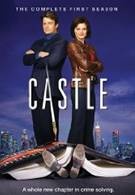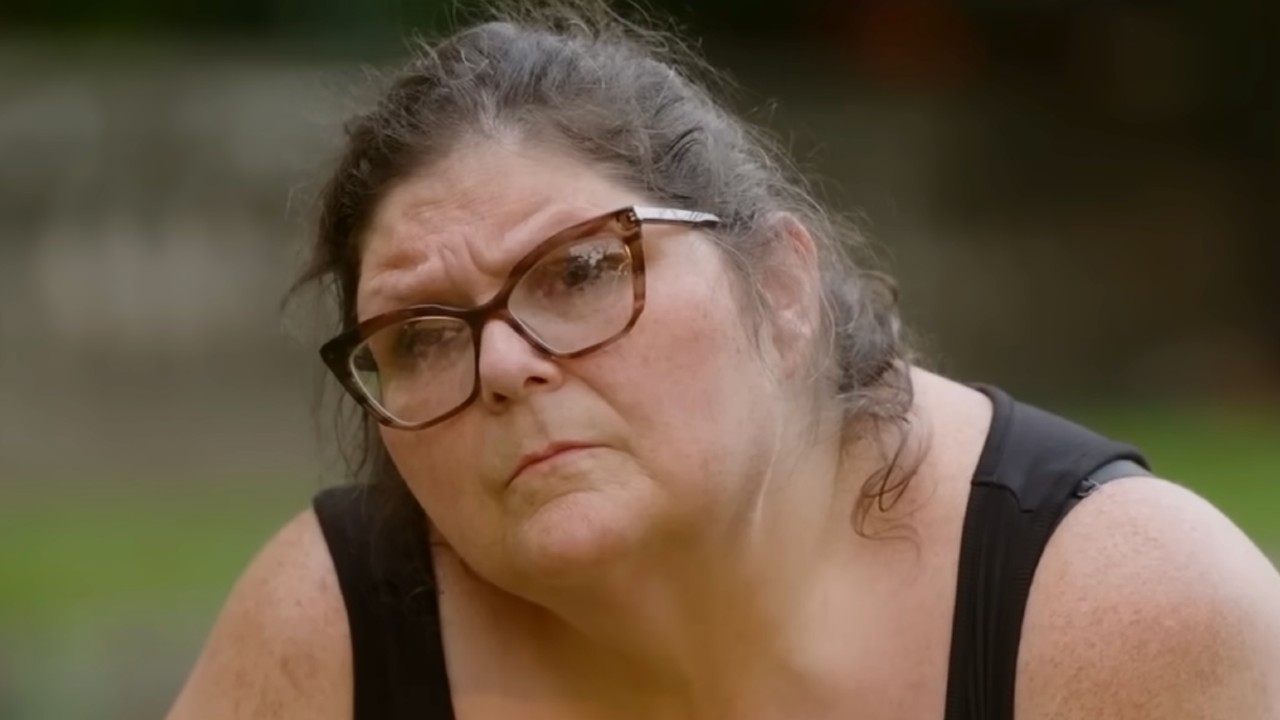Oh, Nathan Fillion, your career should already be a powerhouse of bullet points. Your Everyman appeal keeps you out of asinine comedies, and your genuine knack for the funny doesn't pigeonhole you as an action ham. Your cult-status shoes have been bronzed with a plaque that reads Captain Malcolm Reynolds (Firefly). You made James Gunn's Slither seem almost as good as James Gunn thought it was. You kept Two Guys, a Girl, and a Future Mind-Rape of a Movie Career From Ryan Reynolds worth watching, most of the time. But even with other notable TV and Sing-a-Long turns and minor movie roles, you've still managed to stay low on the radar and land yourself the lead role on Castle, a police procedural with a gimmick. Sayyy, that sounds like something that's nowhere else on TV, right? So much about this show's character dynamics and police casework remind me of the canceled NBC quirk-drama Life, which I enjoyed immensely. It was around episode five of this 10-episode season that I finally allowed that comparison to dissipate and let the minute differences become the ones to judge the show by. Despite my tone in the earlier paragraph, I don't think the show is particularly copy-cattish, and it doesn't hold its gimmick up as its sole beacon of interest, ala Fox's Lie to Me. The scripts, most by series creator Anthony Marlowe, allow for strong character work while developing an atmosphere that hearkens back to primetime murder mysteries, when networks paid money to creative talent instead of people who may or may not think they can dance. But it's Nathan Fillion that keeps me watching.
Fillion plays wit-hound Richard Castle, a mystery writer whose public has recently gone Annie Wilkes-lite on him after he kills off fan-favorite character Derek Storm. His novels all have clever titles like "Storm Clouds" and "Hail Storm," where he plays a cab driver (Not Real). The pilot places Castle in a dark place mentally. He's dealing with writer's block; his mother (the whirlwind that is Susan Sullivan) has moved into his home; his publisher ex-wife is hot on his tail for new work; and his daughter Alexis (Molly Quinn) is maturing faster than he can keep up with. Just as he recognizes his writing problems (that everything is too predictable), he gets called on by Detective Kate Beckett (Stana Katic) to help with a case. It seems someone is killing people based on his Storm novels. Luckily, this is just a one-episode arc, so we aren’t forced to watch Castle arbitrarily tagging along with Beckett as she tries to find this one killer. Instead, we get to see him do it for many cases and many killers, because he's decided to create a new smart, sassy cop character, and he's basing her on Detective Beckett, who is anything but pleased at this circumstance.
Here's my problem with this: money and exposure are the Captain's determining factors for letting Castle tag along. Does the New York Police Department really need exposure? I knew paying large sums of money could get you out of the view of the law, but I didn't know that paying money apparently also gets you in, bypassing all red flags and standard procedures. No lawyer in their right mind would allow a pompous writer to sit in on a suspect's questioning, much less let him badger the suspect directly. But that whole thing could be forgiven if it wasn't for the simple concept that similar shows readily show us: that cops are impervious to success without the help of snappy-tongued outside influences. The show's prominent over-lying arc is a solid example of this, and I'll mention it soon. We're meant to believe that because Castle has done so much research for his books, that as long as there's a twist to the murders, his is the only mind capable of connecting the dots. This has to insult at least one person in a blue uniform, and it renders educational films such as Police Academy obsolete.
In any case, it's again only the details that separate this from other TV fodder. Each episode is as good as the one that follows, because they're played to the same strengths. There's an interesting murder or supposed murder. Castle is happy to go to the scene, and Beckett grimaces. There's an initial misjudgment, and the wrong person gets questioned. Then Castle thinks about things at home, as he connects with daughter Alexis and mother Martha. The father-daughter relationship is one of the stronger ones on television now. It's refreshing to have a single father and not have to hear the words "single father" used ad nauseam. Molly Quinn, in an episode commentary, acknowledges that Castle shows his care by observing his daughter's transition into young adulthood, rather than forcing his hand on every front. It's a worthy assessment. Back at the station, Castle and Beckett bang out the details with the help of Detectives Ryan and Esposito (Seamus Dever and Jon Huertas). Captain Montgomery (Ruben Santiago-Hudson) inevitably tells someone, usually Beckett, to do something they don't want to do. And then Castle ends up finding that one critical clue, or he uses his pull as a writer to tap into areas of the city that the police don't have easy access to. And then criminals go to jail after the rug is pulled from beneath them.
The previously mentioned season-long story arc deals with the fate of Detective Beckett's mother, whose murder is what initially led Beckett into police work. She spent years going over everything in the case file, and chased down every dead-end lead. Stana Katic doesn't miss a beat letting her emotions turn on a dime anytime her mother is mentioned. So we get it, and Castle gets it, but he still has to pursue everything presented to him, no matter what the outcome. And lo and behold, it takes a medical examiner friend of Castle's about a half a day to find a discrepancy that Beckett must have missed. Ludicrous. But that's late in the season, and there is much "I know they won't have sex yet, but just look at the sparks" faux-mance between Castle and Beckett going on in the meantime, which fuels Castle's desire to bring closure to Beckett's life, which only drives them further apart! Why can't you recognize the catch-22, Castle? The DVD set is nice and compact; three discs in a single case. The episodes look and sound great. Though much of it takes place during daylight hours, the subject matter is dark, and the dark colors are as rich as Susan Sullivan's variety-hour wardrobe. I'm grateful the sound design is based around the dialogue, and there aren't any 24-style "every scene is a climax" music cues. Even when high-concept, the show is refreshingly low-key.
There are four commentaries with cast and crew. One for the pilot, two for the finale, and one random mid-seasoner. About one-sixth of the pilot track is dedicated to pointing out the clever edits juxtaposing scene-bits filmed in New York and Los Angeles. "That's New York [laughter]. Now that's in L.A. [laughter]. Now that's New York." Real mile-a-minute information going on right there. Otherwise, they're not terrible.
The expected origins feature "Whodunit: The Genesis of Castle" is somewhat interesting, but covers all the same bases that features like this do. "I like playing this character because they're strong. We have a lot of fun on set. My costume is purrrdy." It really only sets up the much more interesting "Castle's Grandfather," which sits creator Marlowe down with author/TV-wunderkind Steven J. Cannell and show director/executive producer Rob Bowman. These guys explain the genesis of the show better than the one that has "genesis" in the title. Marlowe uses Cannell's large canon of work as an inspiration to make Rick Castle a throwback to Jim Rockford and Columbo. Cannell is a really vivid speaker, and it should be a treat to fans that he plays himself in several guest spots in a poker game of authors that Castle plays in.
Your Daily Blend of Entertainment News
The best feature, though, is "Write-Along With Nathan Fillion," a playfully irreverent behind-the-scenes where Cannell walks Fillion through the motions of being a writer. Though it fizzles towards the end, the satirical gag-fest is quite humorous, and shows Fillion's chops in a meta-role more comically broad than he's usually allowed. Cannell is great at sending himself up as a hardass. Finally, there's an amusing gag reel that is exactly what it's labeled.
At only 10 episodes, maybe this season didn't please me as much as some shows with more extensive first years, but it was better than almost any other mid-season replacement I saw. The first episode of season two was a step in the right direction, so I have no doubts this show will prove itself further as time progresses. The DVD isn't really worth the price tag attached, but it deserves to be watched, especially since reality-TV has all but destroyed off-season repeats.

Nick is a Cajun Country native and an Assistant Managing Editor with a focus on TV and features. His humble origin story with CinemaBlend began all the way back in the pre-streaming era, circa 2009, as a freelancing DVD reviewer and TV recapper. Nick leapfrogged over to the small screen to cover more and more television news and interviews, eventually taking over the section for the current era and covering topics like Yellowstone, The Walking Dead and horror. Born in Louisiana and currently living in Texas — Who Dat Nation over America’s Team all day, all night — Nick spent several years in the hospitality industry, and also worked as a 911 operator. If you ever happened to hear his music or read his comics/short stories, you have his sympathy.

